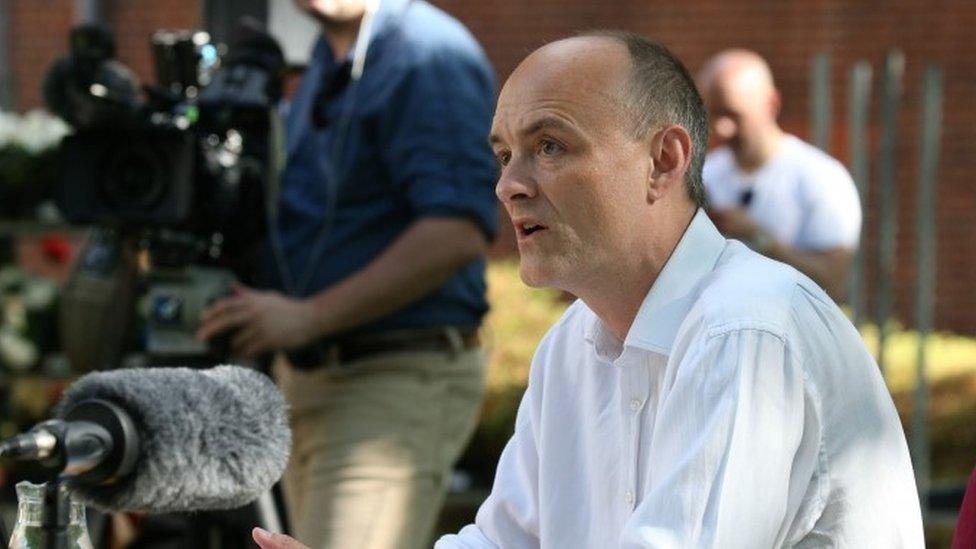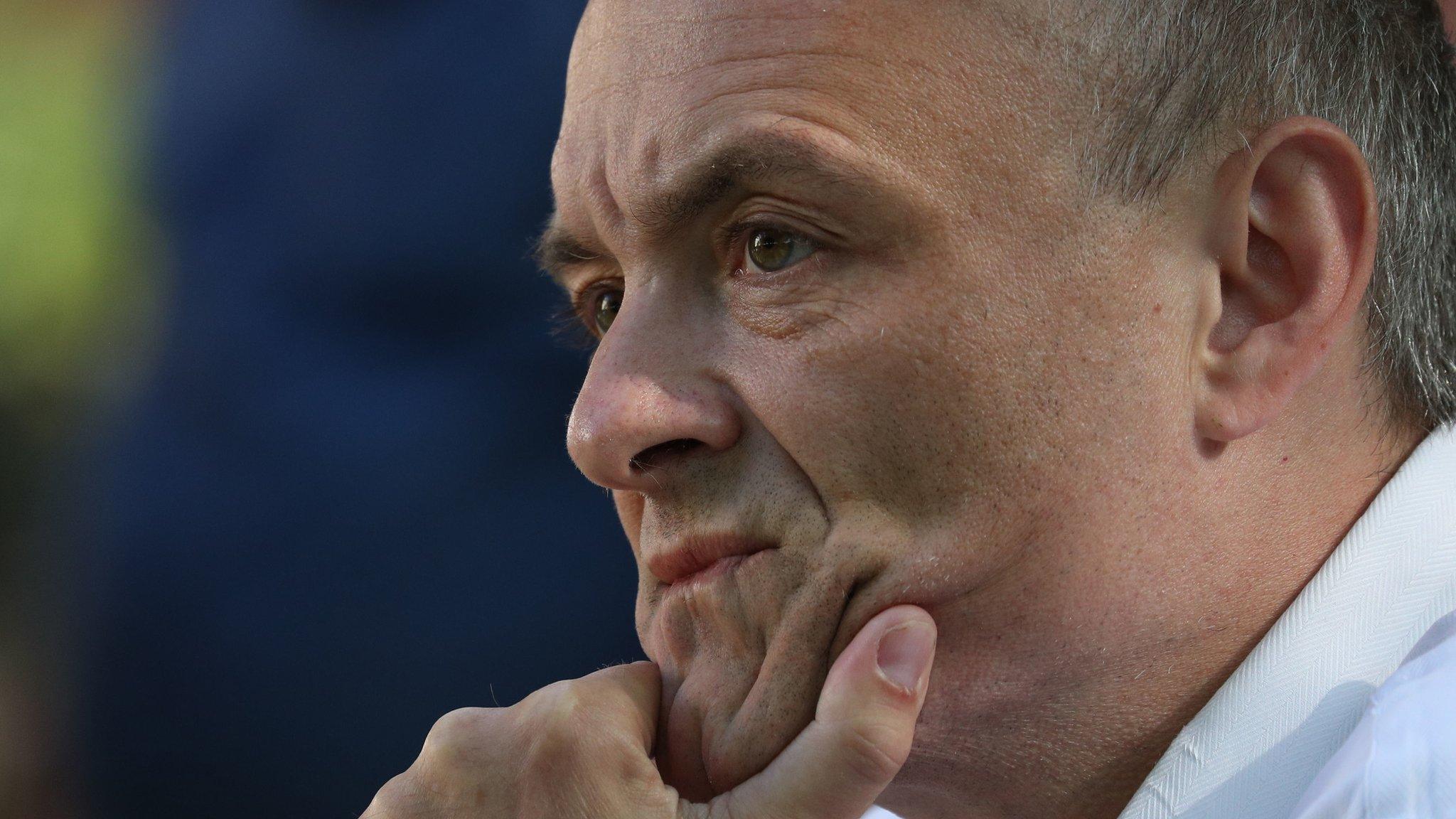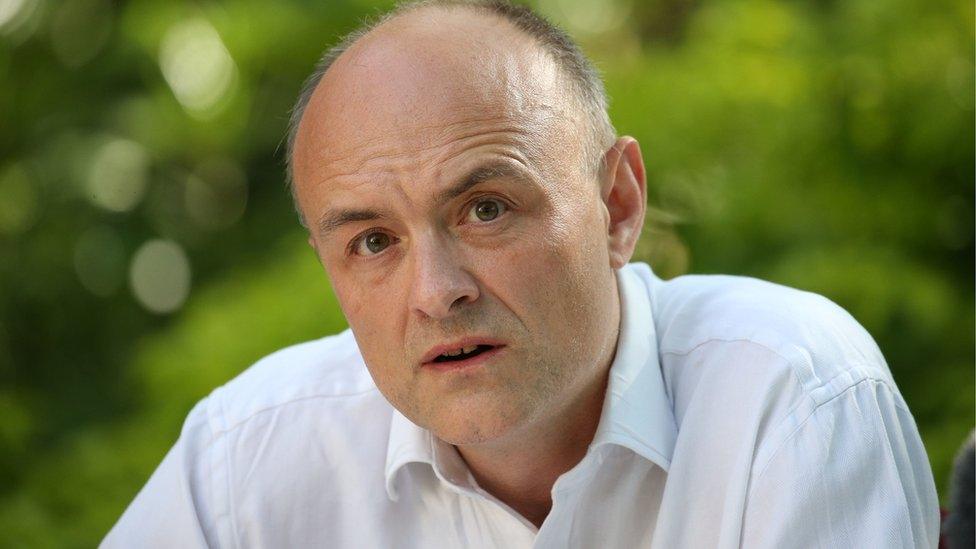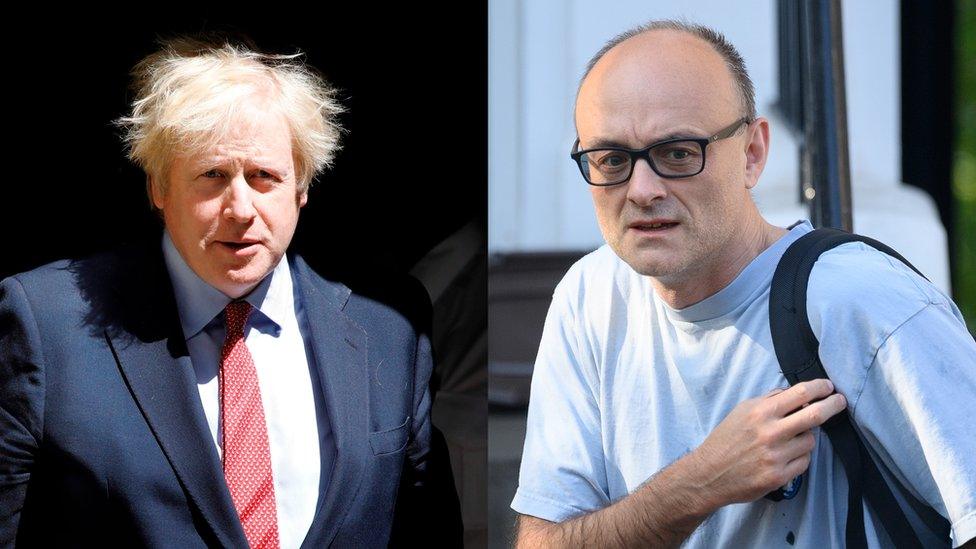Coronavirus: 'Why I want to prosecute Dominic Cummings'
- Published

Dominic Cummings explained the reason for his Durham visit during a press conference in the Downing Street rose garden
A law student hoping to bring a private prosecution of the PM's top aide has been told there is enough evidence for a realistic prospect of conviction.
Mahsa Taliefar, 25, from London, sought formal advice from senior criminal barristers over Dominic Cummings' trips during lockdown.
They say there is sufficient evidence in the public domain to prosecute for two breaches of the Coronavirus Health Protection Regulations 2020.
Downing Street has not commented.
Ms Taliefar says she has singled out Mr Cummings because he was involved in government meetings about the coronavirus and had influence in the regulations she believes he breached.
Advised by Waterfords Solicitors, she asked Benjamin Douglas-Jones QC of Paper Buildings and Nathaniel Rudolf of Bedford Row chambers to consider a range of potential offences related to Mr Cummings' trips to Durham and later Barnard Castle soon after lockdown was imposed.
They concluded that there was sufficient evidence to bring a prosecution over two breaches of Regulation 6, external, which came into force on 26 March, a day before Mr Cummings' car journey to Durham.
It states that, during the emergency, "no person may leave the place where they are living without reasonable excuse" and then lists reasonable excuses such as shopping for groceries, accessing critical public services or caring for a vulnerable person.
In the case of his car trips to Durham and later to Barnard Castle on 12 April, the explanations given by Mr Cummings did not on the face of it constitute a reasonable excuse under the regulations, the barristers advise.

Barnard Castle is set on a high rock above the River Tees
That view was supported by detailed government guidance that if you or any of your household have any of the main symptoms of the coronavirus then you must stay at home and self-isolate.
Mr Cummings has said his wife had some coronavirus symptoms before they made the journey to County Durham, after which he said he developed symptoms himself.
But he said he believes he had acted "reasonably" and within the law by driving to a cottage on his parents' farm when he realised the family would have been left without childcare in London if, like his wife, he had fallen ill. He said his sister and his nieces, who live on his parents' land, had offered to look after his four-year-old son if necessary. He also said stories in the media had made his London home a "target".
However the barristers argue this did not constitute a "reasonable excuse" because, for example, Mr Cummings was not seeking "public services" for his child.
In regards to driving to Barnard Castle on 12 April, the barristers said: "Leaving the place where he was by now living, in Durham, to test his eyesight by driving a medium distance in a car to Barnard Castle to see if he could drive safely, would not, on this professional advice, amount to a reasonable excuse in law."
The sanction for breaching the coronavirus regulations is potentially an unlimited fine.

What is a private criminal prosecution?
While criminal prosecutions are typically undertaken by the Crown Prosecution Service, it is long-established law that any citizen can bring a private criminal prosecution under the Prosecution of Offences Act 1985.
The evidential test that has to be passed to bring a private criminal prosecution is the same as for a case brought by the Crown. Once a private prosecution is brought, the Crown Prosecution Service has the right to take over the case.

The barristers approached the case using the same two-fold test used by the Crown Prosecution Service (CPS) to decide whether to prosecute a criminal offence, testing first where there is sufficient evidence for a realistic prospect of conviction and second whether a prosecution would be in the public interest.
"Driving hundreds of miles from the place where one is living is a significant breach… driving away from an intended destination to test one's eyesight, when Dominic Cummings acknowledged there was a risk constituted a gratuitous and potentially dangerous breach of Regulation 6," the barristers conclude.
"It would be difficult to say that a prosecution was not in the public interest on the facts of the driving on either occasion," they add.
The advice contrasts with the decision reached by Durham police, who examined evidence of offences under Regulation 6 following Mr Cumming's press conference in the Downing Street rose garden on 25 May.
They concluded there might have been a breach in the trip to Barnard Castle but decided not to prosecute because there had been "no apparent breach of social distancing".

Mahsa Taliefar is crowdfunding the legal challenge while continuing to study law and working as a paralegal after graduating from Birkbeck College in the capital.
She is hoping to raise £300,000 to fund the full legal action - which could end up in a costly process known as judicial review.
"A lot of emails and twitter messages I receive are mainly individuals telling me that they were not able to see their loved ones who passed away or at least attend their funerals due to the lockdown restrictions," Ms Taliefar says.
"So when they learnt that Dominic Cummings assumed it was 'OK' to travel 300 miles after suffering from suspected coronavirus and say it was due to childcare, he simply aggrieved all those who adhered to the lockdown.
"I am usually a very active and outgoing person so the lockdown has been quite difficult to adapt to but I understood it was necessary as the laws were created to protect the public.
Dominic Cummings' full statement on lockdown row
"When a member of the government who was involved in the [Scientific Advisory Group for Emergencies] meeting and had an influence in the Covid laws breaks those rules, he has actually undermined those laws and the government efforts in fighting the coronavirus."
Ms Taliefar contrasts Mr Cummings' treatment with the 17,000 "less wealthy and less connected citizens" who have been fined for offences under the coronavirus regulations.
"Many people on social media feel as though the media has let it go, so it's up to them to hold his feet to the fire," she says.
"They are simply demanding better treatment for this country."
Speaking to reporters at a news conference on 25 May, Mr Cummings refuted claims there was one rule for him and another for the public.
"I don't think I am so different and that there is one rule for me and one rule for other people," he said.
He added: "I don't regret what I did."
- Published26 May 2020

- Published25 May 2020

- Published27 May 2020
